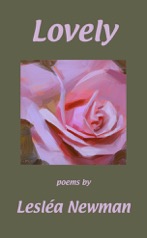
by Helene Meyers
Our Bodies, Our Memories, Our Poetry: A Review of Lesléa Newman’s “Lovely”
 Lesléa Newman is a woman of a certain age, and Lovely, her new volume of poetry (Headmistress Press, $15), revels in that fact. In this collection, Newman’s birth family shares these pages with her beloved. She chronicles her shifting relationship with her own body as she memorializes those who were often violently forced to leave theirs behind. While many of these poems celebrate the sensual pleasures of the past and present, Newman also fleetingly envisions a world to come.
Lesléa Newman is a woman of a certain age, and Lovely, her new volume of poetry (Headmistress Press, $15), revels in that fact. In this collection, Newman’s birth family shares these pages with her beloved. She chronicles her shifting relationship with her own body as she memorializes those who were often violently forced to leave theirs behind. While many of these poems celebrate the sensual pleasures of the past and present, Newman also fleetingly envisions a world to come.
Newman’s trademark compassion is on full display in “Home Safe.” Here the language of nursery rhymes frames the trauma of childhood sexual exploration and abuse: “Little Girl Blue/What happened to you?/Who was it? Who?/And what did he do?” Yet even as the speaker gives full voice to a little girl’s confusion and pain, she also belatedly recognizes that the boy child who overpowered her must himself also have been a victim: “Little Boy Blue,/What happened to you?/Who was it? Who?/And what did they do?”
Several poems are devoted to the life and death of Newman’s mother, the subject of a previous volume of poetry, I Carry My Mother (2015). In the prose poem “Maidel,” the foibles and wisdom of a loving Jewish mother are wittily conveyed, while the somber “My Mother Cups Her Hand” reflects the words not spoken as death becomes imminent.
In “1955-2001: A Hair Odyssey,” Newman’s “frizz bomb/kinky head/Jew fro/ the human barometer” charts her aging process and a path to self-acceptance. The gorgeous “Blessed are the Weeds” metaphorically tells a similar story as “they are not afraid to take up space” and “they respect their roots.” More whimsical is “Your Loss: To The Lovely Butch In Front Of Me At The A&P,” which presents a femme consumer of Hungry Man Dinners as fully able to appreciate “the gluten-free, sugar-free, dairy-free yet delicious-looking pair of sticky buns” in said butch’s basket. And while very few poets could pull off turning a kasha knish into a suitable subject for poetry, Newman manages it in “Ode to a Knish Shop.”
Reminiscent of Newman’s dazzling 2012 October Mourning: A Song for Matthew Shepard, “That Night” is the litany of those who were murdered at Pulse, a gay nightclub in Orlando, on June 12, 2016. In this moving poem that also does the work of queer history, the bar scene is juxtaposed with the horrific death scene that unfolded: “That night the music pulsed through our veins/That night the bullets tore through our veins.” Such historical horrors give rise to “A Farewell to Arms,” a Newmanesque version of John Lennon’s “Imagine” in which bullets, pistols, missiles, stoning, torture, and snipers are no more. In this world to come, there will be “No more hatred, no more blame/No more killing in God’s name.”
The final section of the volume, titled “Nasty Women,” is an intensely personal paean to queer love. The historical “To Have and To Hold” commemorates May 17, 2004, when Massachusetts issued the first marriage certificates to queer couples “bursting with pride.” “The Coming Storm” cunningly counterpoints a meteorological disturbance with orgasmic love and passion: “Outside nasty weather/Inside nasty women.”
Lovely truly is a lovely read and a reminder that the most personal poetry can simultaneously speak to our collective lives, bodies, and histories.
Helene Meyers is Professor of English and McManis University Chair at Southwestern University in Texas. The author of three books, most recently Identity Papers: Contemporary Narratives of American Jewishness, she is currently at work on a project about Jewish American movies. Her more journalistic work has appeared in Lilith, Tablet, Forward, Ms. Magazine Blog, the Washington Independent Review of Books, the Chronicle of Higher Education, and Inside Higher Education. Find her on Twitter: @helene_meyers
The views and opinions expressed in this article are the author’s own and do not necessarily reflect those of Lilith Magazine.